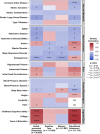Shared genetic aetiology between cognitive functions and physical and mental health in UK Biobank (N=112 151) and 24 GWAS consortia
- PMID: 26809841
- PMCID: PMC5078856
- DOI: 10.1038/mp.2015.225
Shared genetic aetiology between cognitive functions and physical and mental health in UK Biobank (N=112 151) and 24 GWAS consortia
Abstract
Causes of the well-documented association between low levels of cognitive functioning and many adverse neuropsychiatric outcomes, poorer physical health and earlier death remain unknown. We used linkage disequilibrium regression and polygenic profile scoring to test for shared genetic aetiology between cognitive functions and neuropsychiatric disorders and physical health. Using information provided by many published genome-wide association study consortia, we created polygenic profile scores for 24 vascular-metabolic, neuropsychiatric, physiological-anthropometric and cognitive traits in the participants of UK Biobank, a very large population-based sample (N=112 151). Pleiotropy between cognitive and health traits was quantified by deriving genetic correlations using summary genome-wide association study statistics and to the method of linkage disequilibrium score regression. Substantial and significant genetic correlations were observed between cognitive test scores in the UK Biobank sample and many of the mental and physical health-related traits and disorders assessed here. In addition, highly significant associations were observed between the cognitive test scores in the UK Biobank sample and many polygenic profile scores, including coronary artery disease, stroke, Alzheimer's disease, schizophrenia, autism, major depressive disorder, body mass index, intracranial volume, infant head circumference and childhood cognitive ability. Where disease diagnosis was available for UK Biobank participants, we were able to show that these results were not confounded by those who had the relevant disease. These findings indicate that a substantial level of pleiotropy exists between cognitive abilities and many human mental and physical health disorders and traits and that it can be used to predict phenotypic variance across samples.
Conflict of interest statement
IJD is a participant in UK Biobank. The remaining authors declare no conflict of interest.
Figures

References
-
- Deary IJ, Weiss A, Batty GD. Intelligence and personality as predictors of illness and death: how researchers in differential psychology and chronic disease epidemiology are collaborating to understand and address health inequalities. Psychol Sci Public Interest 2010; 11: 53–79. - PubMed
-
- Strachan MW, Reynolds RM, Marioni RE, Price JF. Cognitive function, dementia and type 2 diabetes mellitus in the elderly. Nat Rev Endocrinol 2011; 7: 108–114. - PubMed
-
- Deary IJ. Cognitive epidemiology: its rise, its current issues, and its challenges. Pers Individ Dif 2010; 49: 337–343.
Publication types
MeSH terms
Grants and funding
LinkOut - more resources
Full Text Sources
Other Literature Sources

